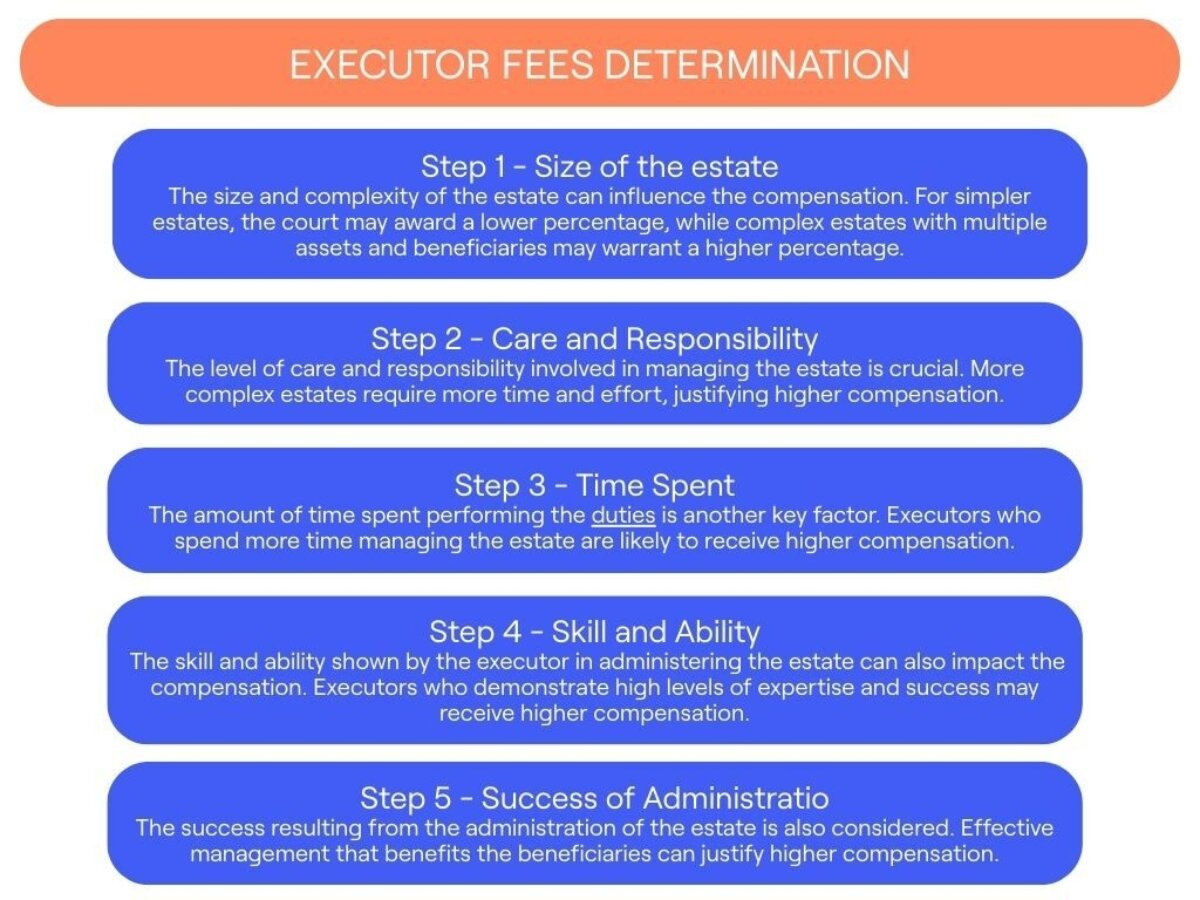Estate Settlement
Dec 04, 2024
How Do Executors Mail Inheritance Checks?
Find out how inheritance checks are mailed, including security measures and what to do if there are delays in receiving them.
Generally, an estate executor in Ontario gets paid 5% of the estate’s value. However, this percentage fee isn't always the case. Read on to learn more.


Executor Compensation Rate: Executors in Ontario may receive up to 5% of the estate’s value for their services, typically divided into 2.5% on assets received and 2.5% on assets distributed.
Flexibility of Fees: The 5% rate is a guideline. Actual compensation depends on multiple factors and can be negotiated with beneficiaries or determined by the court based on specific criteria such as estate size, care level, time, skill, and success in administration.
Executor Duties Justify Fees: Executors undertake significant responsibilities, including managing assets, paying debts, and distributing inheritances, which justify their compensation.
Tax Obligations: Executor fees are considered taxable income and must be reported to the CRA. The estate must deduct and remit CPP and income taxes.
Payment Timing: Executors are usually paid after all estate obligations are fulfilled, which may take a year or more, depending on estate complexity.
Being an estate executor means you’ve taken on the responsibility of honouring your loved one’s wishes, but that doesn’t mean it’s necessarily done for free.
Executors are often entitled to compensation for their time and efforts spent on the settlement process, which is paid out by the estate.
Here is how the executor’s compensation is calculated in Ontario.
Under Ontario’s Trustee Act, an executor is entitled to "fair and reasonable" compensation for their work. Courts often use a guideline of ~5% of the estate flows, which is 2.5% of receipts (what the estate takes in) + 2.5% of disbursements (what it pays out). The amount can be adjusted up or down by a court based on factors like the estate’s size, the level of care/responsibility, time spent, the executor’s skill, and results achieved. Only assets that actually pass through the estate are counted; joint assets and registered accounts or life insurance with a named beneficiary usually bypass the estate and are not part of the base.
Here’s an example of how an estate would compensate an executor under Ontario’s guidelines.
Let’s say an Ontario man passes away with the following assets.
Asset Type | Approximate Value |
Family home | $500,000 |
Vehicle | $5,000 |
Bank Accounts & Investments | $50,000 |
All the above assets are transferred to the estate and distributed to beneficiaries. Using the rough 2.5% guideline on receipts and 2.5% on disbursements, this would amount to approximately $27,750.
Input the gross value of the estate to calculate the executor's fee in Ontario, which is typically 5% of the estate's value.
Enter the total value of the estate without deducting any debts or expenses.
Keep in mind that this 5% fee is a general guideline rather than a fixed rate.
According to Section 61(1)of the Trustee Act, a trustee is entitled to "such fair and reasonable allowance for the care, pains, trouble, and time expended in administering the estate" as may be allowed by a judge of the Superior Court of Justice.
Although there is a practice of awarding estate trustees compensation based on a percentage of the following amounts:
Capital receipts – amounts that add to the estate’s principal (e.g., proceeds from selling the house or investments)
Capital disbursements – payments out of principal (e.g., funeral expenses, paying debts, specific bequests from the will)
Income receipts – income earned during administration (e.g., interest, dividends, rent).
Income disbursements – expenses chargeable to income (e.g., investment management and bank fees, insurance).
Depending on the complexity of the estate, an executor may also charge up to 0.4% per year for "care and maintenance" as a management fee for the estate.
This practice is not set in stone, and executor compensations are actually made on a case-by-case basis.
For example:
(A) For an estate with only one real estate property, the court may warrant less than a 5% executor compensation, seeing as it is a relatively simple estate.
(B) For a larger estate with multiple beneficiaries around the world, and several properties, a reasonable compensation may be higher than 5% seeing as it is a larger and more complex estate.
As outlined by Ontario's Superior Court of Justice, estate executors in Ontario may charge a compensation of up to 5% of the estate's value.
The logic behind the 5% executor fee is as follows:
For a quick estimation based on the maximum rate, use our executor fee calculator below:

Under Ontario’s Trustee Act, an executor is entitled to a “fair and reasonable” allowance, set by the court if not fixed by the will. Courts often start from a guideline of 2.5% of all capital receipts + 2.5% of all capital disbursements + 2.5% of income receipts + 2.5% of income disbursements, and may allow up to 0.4% per year for care‑and‑management where there is ongoing investment management. The court then adjusts this figure up or down using the standard five‑factor test (size, care/responsibility, time, skill/ability, results). For real estate, compensation is usually calculated on the net proceeds that actually reach the estate, not the gross sale price.
Executors have a fiduciary duty to act in the best interests of the estate and its beneficiaries, and their compensation should reflect the level of care and responsibility required to fulfill that duty.
It's important for both the executor and the beneficiaries to have a clear understanding of how the executor's compensation will be calculated and what expenses are included.
If a testamentary gift is linked to the executor’s duties, the entire gift may be treated as taxable executor compensation. The Canada Revenue Agency (CRA) scrutinizes will language to determine if an inheritance is tied to executor responsibilities. Clear and precise wording in the will is essential to avoid unintended tax consequences for the executor.
Executors receive their fees from the estate once all outstanding taxes and bills are paid, assets are administered, and heirs are located - which is typically paid at the end of the estate settlement process. This process often takes about a year, but can take longer if the estate is complex or if there are disputes among beneficiaries.
The Canada Revenue Agency (CRA) has clear guidelines on how executors' fees should be treated for tax purposes that potential executors should be aware of. Below is a simple breakdown.
The CRA classifies executors' fees as taxable income—either through business income or income from an office, depending on the circumstances. If the executor is acting within the scope of a business, the fees are considered business income and included under subsection 9(1) of the Income Tax Act.
On the other hand, if the executor is not acting as part of a business, the fees are classified as income from an office and generally does not withhold CPP/EI/income tax.
This classification has significant implications for the tax return process for executors, requiring careful documentation and reporting.
Determining fair compensation for your executor can be challenging, particularly since you won't be there to guide the process. You want to ensure the amount is reasonable and won't create conflict among family members during an already difficult time.
If you’re wondering about writing a will for the first time, or adjusting yours to include executor compensation, reach out to one of our qualified estate professionals for a free 30-minute consultation. We can help guide you through the entire will drafting process, using understandable, non-technical language. We’re here to help
Does each executor get 5% if there are co-executors? | No, typically the 5% fee is split among co-executors, not given to each one individually. For example, if the standard executor compensation is 5% of the estate value and there are two co-executors, they would usually share that 5% (so 2.5% each), rather than each receiving 5% (which would total 10%). |
What is the average executor fee in Ontario? | Ontario practice uses 2.5% of receipts + 2.5% of disbursements. This number is only a guideline, as courts use multiple factors to determine executor compensation. These factors may include, executor skills, the complexity of the estate, time spent to settle the estate and the care and responsibility owed from the executor. |
What if the executor and beneficiaries cannot agree on the executor’s compensation? | If beneficiaries disagree with the executor's compensation, whether it’s specified in the will or not, they should first attempt to negotiate a mutually acceptable amount. If an agreement can't be reached, the executor must apply to the court for approval of their compensation through a formal "passing of accounts" process, where a judge will determine the appropriate fee based on provincial guidelines and the specific circumstances of the estate. |
Can an executor refuse to be compensated? | Yes, an executor can formally refuse compensation. This may happen if the executor is a close family member of the deceased and prefers to complete their duties without payment. An executor may also be a beneficiary of the estate, in which case it is common for compensation to be refused as they are already receiving an inheritance. |
Are executor fees considered taxable income? | Similar to a salary or wages for services provided, executor fees are considered a form of taxable income. This holds true even if the executor is also a beneficiary. Individuals acting as executors who do not do so professionally will claim their compensation as employment income or income from an office. The estate is required to issue a T4 slip and withhold the appropriate remittances (e.g. CPP). Professional executors, however, claim their fees as business income. The estate is required to issue them a T4A slip unless extenuating circumstances apply. |
How much tax do you pay on executor fees? | Executor compensation for non-professionals is treated as standard income and is taxed at the individual's personal marginal tax rate. As an example, let’s say an Ontario woman acted as executor for an estate worth $250,000, and she earned $12,500 in executor compensation. She also worked a full time job and earned $50,000 in the same year in employment income. With her combined taxable income being $62,500, she would be at a provincial marginal tax rate of 9.15% and a federal marginal tax rate of 20.5%. Without the executor fees, she would only be at a provincial marginal tax rate of 5.05% and a federal marginal tax rate of 14.5%. |
 Simplify Probate Today
Simplify Probate Today
Get expert guidance from our probate specialists who've helped 10,000+ families.
Book a free consultation today